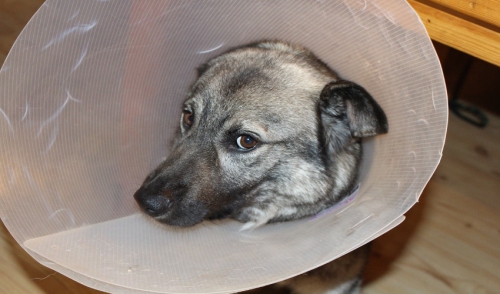
The prospect of surgery can be traumatic for owners and pets alike, whether it is a simple procedure such as spaying or neutering, or a more complex procedure with an uncertain outcome. Knowing how to prepare for the surgery, what to do during the operation and how to provide appropriate care after the procedure can ease stress and speed recovery so pets and owners have many happy years together.
Before the surgery…
- Discuss alternative treatments with your veterinarian, particularly if your pet has a high surgical risk or additional health concerns that could cause complications.
- Follow all vet instructions for what food, water, or medications your pet should or should not have prior to surgery.
- Give your pet a good bath and grooming so they will be more comfortable and there is no bacteria or dirt to cause a contamination risk.
- Discuss cost estimates and payment options with your veterinarian, including whether the surgery may be covered under an insurance plan.
- Take photos of your pet and spend good quality time with them, but taking care not to aggravate their condition.
- Bring a supply of their preferred food to the vet, along with other supplies if permitted, such as a familiar toy or blanket, to make them more comfortable and less stressed.
- Be on time on the day of surgery so there is adequate time for the hospital staff to perform a physical, do necessary bloodwork and otherwise prepare your pet for the operation
During the surgery…
- Be sure the veterinarian and hospital staff have a good way to contact you, and ask when you can call for an update about your pet's condition. Do not call before the time they stipulate as they may not be able to release any information early.
- Keep yourself busy so your mind does not linger on unpleasant possibilities, no matter how remote they may be. This is a good time to clean your pet's bed and make your home safe for them after the surgery, such as removing trip hazards or other obstacles that could slow recovery.
After the surgery…
- If your pet cannot come home right away, arrange to visit briefly if possible to reassure both you and your pet during this unfamiliar time.
- Be on time for your pet's discharge appointment, and carefully note any post-operative care instructions or necessary precautions you will have to follow.
- Be aware of symptoms of surgery complications or post-op infections, and follow the recommended cleaning and care of suture areas if applicable.
- Keep your pet less active and more closely confined in a crate or small room if necessary for several days after the operation so they do not overexert themselves.
- Complete all follow-up appointments or physical therapy exercises as directed to be sure your pet can fully recover.
The prospect of surgery can be a scary one for any pet owner, but by knowing what to do to prepare and deal with that surgery appropriately, the event can be far less traumatic and both pet and owner can recover quickly.







Comments